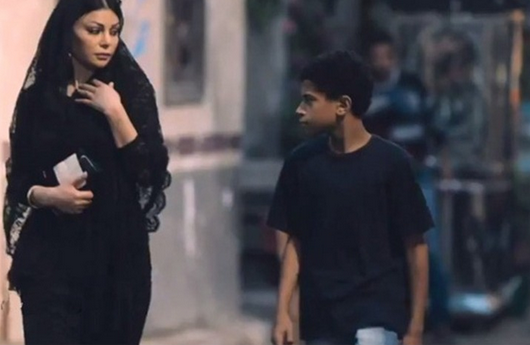Lebanese star's movie pulled from Egyptian screens

Egypt has suspended screenings of Lebanese film and pop star Haifa Wehbe's latest movie following accusations that some scenes were sexually provocative.
Interim premier Ibrahim Mahlab ordered Halawet Rooh (Beauty of the Soul) off the screens until Egypt's censorship board reviews it again, the prime minister's office said late Wednesday.
The Egyptian-made movie, said to have been inspired by Italian actress Monica Bellucci's 2000 hit Malena, was released across the country on 3 April for adult-only audiences.
The film revolves around Rooh, played by dark-haired pop star Wehbe, who ignites passion among the men in her neighbourhood when her husband is away.
The real controversy, however, comes from the star’s dalliance with a teenage boy.
New MEE newsletter: Jerusalem Dispatch
Sign up to get the latest insights and analysis on Israel-Palestine, alongside Turkey Unpacked and other MEE newsletters
According to the Arabic online news portal Arabi21, the decision to ban the film was the result of several complaints made by the National Council for Childhood and Motherhood, and the National Council for Women. The two institutions demanded that the government ban the movie for its infringement on women and children rights, and breach of social norms.
Among other content deemed inappropriate by women groups, the film shows a rape scene, and vulgar language used by the children, according to local media reports.
"The film is a real danger to the morality of the children, and endangers their values." according to a statement released two days ago by the National Council for Childhood and Motherhood. "Moreover, it is not compatible with the traditions and customs of Egyptian society.”
Wehbe, who is no stranger to criticism for her signature raunchy dance moves and provocative attire, has also been singled out for criticism.
Independent newspaper Al-Masry Al-Youm lashed out in a movie review headlined: "Halawet Rooh: how to produce an Egyptian porn movie?"
"The movie doesn't miss one scene of Haifa without her exposing a part of her body," Ramy Abdel Razak wrote in the review.
"In the only scene where she is dressed modestly ... the clothes are torn off her in a provocative way," the reviewer said.
The film's producer Mohamed al-Sobky has dismissed the criticism.
The film contains "nothing that outrages public decency," he told Al-Mehwar television, adding that so far Qatar was the only Arab state were his film was not being screened.
Not everyone welcomed the suspension.
"The one who bans a movie because he thinks it breaks morals will ban a movie tomorrow for political reasons,” television host Ibrahim Eissa said.
The ban was also criticised by a number of Egyptian filmmakers who saw the suspension as interfering in the work of the country's censorship board which had approved showing the film, according to Aleqtisadiah.
Middle East Eye delivers independent and unrivalled coverage and analysis of the Middle East, North Africa and beyond. To learn more about republishing this content and the associated fees, please fill out this form. More about MEE can be found here.


